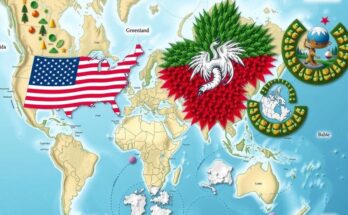The political battle surrounding Hurricane Milton began before the storm made landfall, highlighting the role of partisanship in crisis management. Former President Donald Trump aims to exploit the situation to undermine the current administration, while Vice President Kamala Harris strives to showcase effective leadership and counter misinformation. President Biden adjusts his schedule to respond promptly, with historical precedents of storm politics influencing current dynamics. The situation exemplifies the intertwining of political narratives with disaster management, which impacts upcoming elections.
The political discourse surrounding Hurricane Milton surged before the storm even made landfall, revealing a contentious struggle for narrative dominance in the face of a potential natural disaster. This catastrophic event, intensified by climate change, is at the center of growing partisan divides as the nation approaches a critical presidential election. The looming specter of Hurricane Milton has been co-opted by political leaders, particularly Donald Trump, who is poised to exploit the situation by disseminating misinformation and casting doubt on the capabilities of the current administration. Historically, the political ramifications of hurricanes materialize post-disaster, however, in this instance, the battle lines have been drawn early, largely influenced by Trump’s prior actions during Hurricane Helene. For Vice President Kamala Harris, Hurricane Milton presents a dual challenge and an opportunity to demonstrate leadership amidst adversity. She faces heightened scrutiny regarding the federal government’s response to the impending storm and the socio-political narrative that Trump intends to shape. Harris has made concerted efforts to counteract Trump’s premature assertions regarding government aid and emergency response. By calling attention to the misinformation propagated by the former president, she underscores the importance of unity and support in times of crisis. In tandem, officials from FEMA have echoed her concerns regarding the potential panic instigated by Trump’s rhetoric. President Joe Biden’s response involves significant urgency, as he has altered his schedule to address the impending crisis, illustrating the gravity with which his administration intends to handle the disaster. Biden’s presidency, characterized by a tumultuous foreign policy backdrop, is also heavily invested in protecting his domestic legacy as he navigates the storm’s impending arrival. Trump’s tactics involve leveraging every opportunity to criticize Harris and Biden’s administration while absolving himself of responsibility for any failures. His sharp critiques and misleading narratives about federal relief efforts aim to solidify his position with supporters who may be susceptible to his alternative representations of reality. Furthermore, the political landscape surrounding storm responses has been notably shaped by historical precedents, notably Hurricane Katrina and Superstorm Sandy, influencing modern-day political maneuvering. As Gov. Ron DeSantis balances the complexities of state and federal cooperation, his actions may significantly impact his political capital and future ambitions. In conclusion, the battle over Hurricane Milton encapsulates the erosion of bipartisan cooperation in the face of natural disasters, transforming a moment of potential unity into a battleground for political leverage. The interplay of misinformation, public perception, and leadership effectiveness will likely determine not only the outcome of this storm but also the forthcoming electoral landscape. This narrative serves as an indictment of how pervasive partisanship has infiltrated even the most apolitical domains of public service.
The article discusses the political conflict arising from Hurricane Milton, a potentially devastating storm exacerbated by climate change. It examines the preemptive political actions taken by various leaders, particularly Donald Trump and Vice President Kamala Harris, as they navigate the charged atmosphere leading up to a major presidential election. The narrative also explores the historical context of storm-related politics, referencing the implications of past hurricanes on presidential legacies.
The ongoing political wrangling over Hurricane Milton underscores the pervasive influence of partisanship in disaster management. Leaders are not only tasked with addressing the immediate needs of their constituents in emergencies but also contend with the narratives that emerge in the wake of such crises. Ultimately, the political fallout from Hurricane Milton may redefine perceptions of leadership and competence in an already volatile atmosphere.
Original Source: www.cnn.com




